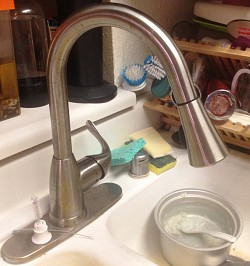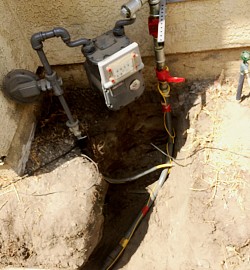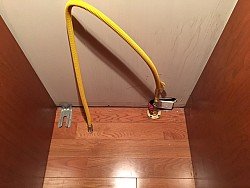Plumbing Basics: Questions You Always Wanted to Ask
Q. Do I need a permit to upgrade my plumbing?
A. When in doubt, check it out. Even an apparently minor plumbing upgrade like water heater replacement may require a permit, and every locale has its own regulations. There's a good chance they will also specify that you hire only a licensed plumbing contractor. PS: Don't forget to find out what's allowed under the terms of your homeowners insurance as well.
Q. How can I tell if I have a plumbing leak?
A. Be alert to the signs of excessive moisture in your home -- such as damp stains on the walls or ceiling, bubbling and peeling paint, wet floors when you haven't showered recently, musty or acrid odors, and mold growth. To verify whether any of these is the result of a plumbing leak, turn off all the water in your home and check whether the water meter continues to turn. If so, you've got a leak somewhere in your plumbing system.
Q. What can I flush down the toilet?
A. You can flush all kinds of things down the toilet. Just ask any two-year-old. However, there's a difference between what you can and what you should flush if you don't want to plug up your facilities. Over time, even seemingly flushable substances such as hair clippings and leftover house paint can cause problems in your plumbing pipes. To stay on the safe side, stick to flushing only bodily wastes and toilet paper.
Q. Which plumbing repairs can I DIY?
A. The answer is: "That depends." If you are an absolute newbie at the DIY game, home plumbing is not where you want to start. Paint a wall or install an adhesive tile backsplash instead. On the other hand, once you have developed some know-how and self-confidence in household fixes (and have filled your toolbox with essential equipment), you could try your hand at repairing a drippy faucet or replacing a toilet. One "skill" every adult should have is the knowledge of where your main water valve is located and how to shut it off in an emergency.
Q. What's a good recipe for dealing with a clogged sink?
A. A minor sink clog may be remedied by pouring half a cup of white vinegar down the drain, then sprinkling with one quarter cup baking soda. After 15 minutes, flush with several cups of boiling water. If that does not take care of the problem, try snaking with a manual auger or a more powerful electric version. Another solution might be to clear out the sink's U-bend.
Q. Which is better -- Copper or PEX?
A. The jury is out on this one. Copper piping was the gold standard of plumbing for decades. It is durable, fire-resistant, and recyclable. It can be corroded by the water that runs through it, though, if the pH level is unbalanced. Copper for plumbing pipes has also become very expensive. PEX piping, at less than one-tenth of the price, is fast and easy to install, resisting leaks and breakage. However, it cannot be recycled or used outdoors, and it may foster water contamination.
Q. Is there a normal level for household water pressure?
A. Yes, 40-60 pounds is normal. While water pressure below this level is obviously problematic (you won't get much of shower, for example), it should not be too high either. Over 80 pounds pressure may damage your fixtures and appliances. To test your water pressure, buy an inexpensive gauge. This attaches to an outside faucet and can be used to adjust pressure as necessary.
Q. Should I buy that gorgeous "fixer-upper" with the 1950s plumbing?
A. Here's a question for you: How attractive is the price compared to other properties in the same area? If it's a real steal, you might want to ask if you can bring in a licensed plumber to give an estimate of how much it would cost you to upgrade the plumbing. (Of course, any offer to purchase you eventually make should be subject to approval by a building inspector, as well.)
Laura Firszt writes for networx.com.
Updated November 21, 2018.
Looking for a Pro? Call us (866) 441-6648

Plumbing Average Costs
Plumbers Experiences

Our Kitchen Faucet And Pipe Replacement

Gas Line Installation Made Simple




